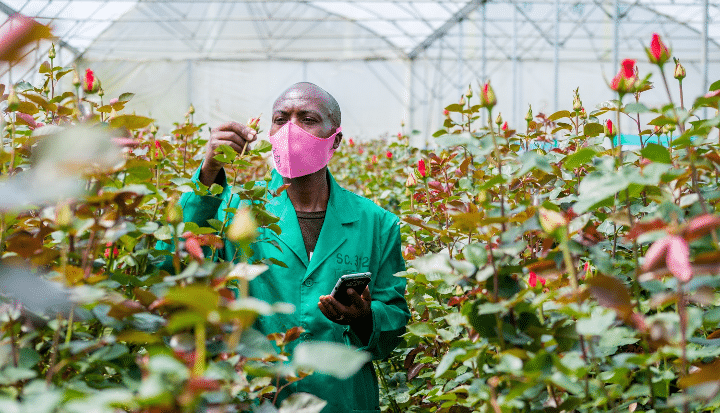Recent crises worldwide have highlighted how fragile our global supply chains can be when disaster strikes. Whether it’s Covid-19, climate or conflict-related, these crises underscore the importance of ensuring the people who produce our goods and food earn enough to protect their livelihoods from shocks.
At Fairtrade, we are committed to achieving living wages for workers behind products such as bananas and flowers. Workers have a right to earn enough to afford a decent standard of living for their household – including nutritious food, healthcare, education and decent housing – plus extra for savings and emergencies so they can plan for the future. Otherwise, it is impossible to tackle poverty, build market sustainability or address global challenges like climate change.
Fairtrade has long been a pioneer in this sphere: as well as being a founding member of the Global Living Wage Coalition, we recently signed a partnership with IDH (the Sustainable Trade Initiative) to accelerate our work on living wages and living incomes in food supply chains. Meanwhile our tailored programmes address specific root causes of low wages and challenges per origin, allowing businesses to partner with us to address key issues such as gender pay gaps.
Valuable as our progress is, only through collective, sector-wide action can we truly address deep-rooted, systemic inequalities in global supply chains. I’m personally encouraged to see growing momentum among both Fairtrade and non-Fairtrade businesses towards accelerating an approach to living wages for workers.
Fairtrade’s own approach to closing the gap involves interventions under five cross-cutting pillars. These kick in once stakeholders have collected data to verify and track the living wage gap in their supply chains.
- Price-based interventions
While living wages will, ultimately, be achieved through wage floor increases in countries of origin, we cannot underestimate the importance of price increases. Examples include the Fairtrade Base Wage for banana plantations, launched in 2021. Set at 70% of the take-home pay needed for a living wage, it is unique among certifications schemes and a concrete step towards a living wage. (In Dominican Republic, for instance, earnings are estimated to rise by up to 15%, benefiting 15,000 workers.)
Price-based interventions, for us, include the Fairtrade Minimum Price, part of the Fairtrade Premium (an extra sum producers spend on initiatives of their choice) and any additional living wage top-ups that buyers may pay to plantations or governments mandate as wage floors to workers.
- Value transfer to workers
Any living wage increases in payments paid to farms must be effectively transferred to workers. Collective bargaining mechanisms, through trade unions and democratic worker cooperatives, are important for ensuring equitable distribution of wage top-ups. Workers should also be regularly consulted on cost-of-living increases and the appropriateness of in-kind benefits. Fairtrade works to strengthen collective bargaining mechanisms, engage formal trade unions, enhance awareness of worker’s rights and support farm/plantation management’s capacity to negotiate with worker representatives.
- Plantation-level efficiencies and processes
Interventions much recognise the need for plantations/large farms to adapt to climate impacts, drive sustainable enhancements in productivity and quality, and ensure they run at optimum capacity (but not at workers’ expense). They also need appropriate environmental practices, quality controls and management processes (such as effective governance, worker safeguards and tailored approaches for contracting different worker demographics like migrants and women).
- Institutionalisation
The fourth pillar looks at wider sector governance and addresses the institutionalisation of supportive policies. We believe coordination between supply chain actors, NGOs, certification schemes, trade unions and government is critical to ensuring effective government action on wages. It’s also vital for designing and implementing policies that can embed practices within supply chains and help to ensure durable local labour markets.
- Buyer practices
Although Fairtrade’s Standards work holistically across supply chains and enforce minimum terms of trade for buyers, they must take steps to progress a living wage for workers in their supply chains. These include by building longer term trading relationships, minimising short-term gains from commercial practices, recognising the real production costs plantations face, and reviewing their own position in the sector to understand what levers of influence are open to them. Again, partnerships are critical, so buyers should adopt a sector-wider perspective and engage in pre-competitive dialogue, embracing trust and openness.
Companies wishing to pay workers a living wage shouldn’t do so at the expense of smallholder farmers by shifting sourcing away from them and towards plantations that can demonstrate their wage payments. Smallholder farmers will struggle to track and report on wage data at the scale of larger plantations. Their livelihoods shouldn’t be threatened simply because they have less mature management structures, especially since farmers make up over a third of the producers who grow Fairtrade bananas.
Let’s be clear: there’s no silver bullet to closing the living wage gap. Our experience has shown that it requires transparent and honest reflections from all involved, a commitment to robust data and feedback processes, and interventions that are co-created with producers, contextually determined and supported by cross-industry action. Nevertheless, by coordinating across these pillars, I believe the sector can move closer to making living wages a reality for workers. And we shouldn’t stop there: we must push ourselves beyond salaries and aspire to excellence in working conditions for producers.
At Fairtrade, we’ll continue engaging closely with the entire supply chain to develop pilot and sector-wide programmes that test practical solutions to addressing barriers to living wages. We invite more partners to join us on this journey. It’s the right thing to do, for workers, for their communities and for a more sustainable world.
For more information, read ‘Fairtrade Foundation’s Approach to Living Wages’.










